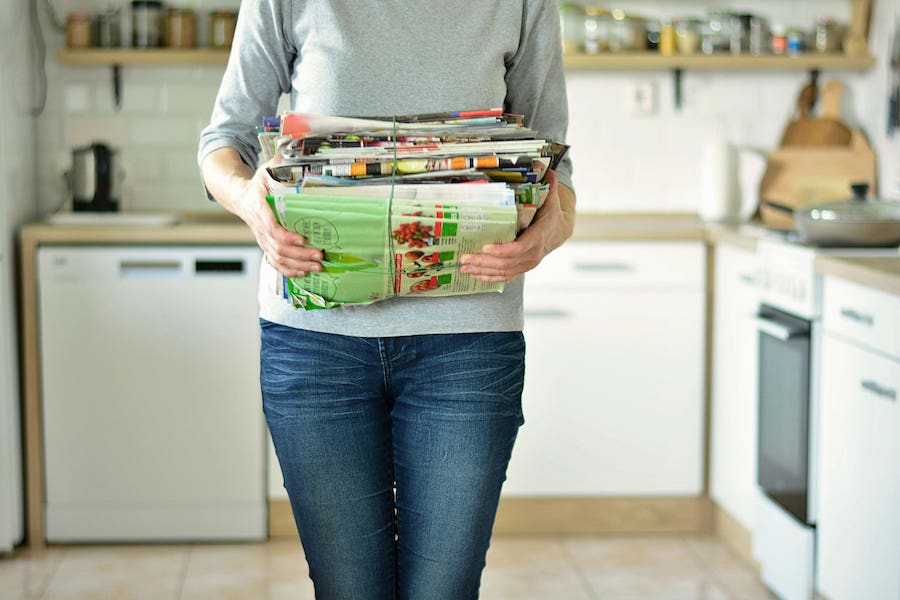Things you didn’t know you can actually recycle
Turns out there's a bunch of stuff you can do to help save the planet
Even the keenest environmentalist can sometimes get caught out.
On the days when you’re rushing around the house, it can be easy to forget to check the packaging on something before you chuck it in the bin.
To point you in the right direction, experts shed some light on common household items you can actually recycle – instead of unwittingly sending them to the landfill…
View this post on Instagram
Wine corks
“Many people don’t realise wine corks can actually be recycled,” says William Hobbs, sustainability and recycling expert at MyJobQuote.co.uk.
“Cork is a sustainable and renewable resource, and recycling helps reduce the demand for new cork.”
Many recycling programs accept wine corks, or you can send them to a company that specialises in cork recycling, says Hobbs. “The recycled cork can be used to make a variety of products, including flooring, insulation and even yoga blocks.”

Mattresses
Believe it or not, mattresses can be recycled, says Hobbs.
According to Recycle For Greater Manchester, 95% of materials from mattresses can be recycled.
“Recycling mattresses helps to conserve natural resources and reduce landfill waste,” notes Hobbs. “If you have an old mattress you need to get rid of, check with your local waste management company to see if they offer mattress recycling services.”
CDs and DVDs
View this post on Instagram
With the rise of digital media, CDs and DVDs have become somewhat obsolete, suggests Hobbs. However, they can still be recycled.
“CDs and DVDs are made of a type of plastic called polycarbonate, which can be recycled into a variety of products, including automotive parts and office equipment. Some recycling programs accept CDs and DVDs, or you can send them to a company that specialises in recycling them.”
Carpets
When you replace your old carpet, don’t just throw it away – recycle it.
“Most carpet is made of nylon or polyester, which can be recycled into a variety of products, including new carpet, plastic lumber and automotive parts,” says Hobbs.
“Many carpet manufacturers have recycling programs in place, or you can check with your local waste management company to see if they offer carpet recycling services.”
Crayons
View this post on Instagram
If you have kids, you know crayons can pile up quickly – but don’t toss them in the bin, urges Hobbs.
“Crayons can be recycled into new crayons, or even used as a fuel source. Many recycling programs don’t accept crayons, so you may need to look for a specialised recycling program,” he advises.
You could even donate old crayons “to schools, hospitals, and art programs – which is both useful, and wholesome”, adds Hobbs.
Old phones and laptops
View this post on Instagram
As Nick Swan, tech expert and founder of SEOTesting.com puts it: “Many tech users still feel unsure about the best way to recycle their undesired electronics.”
He says some local councils offer to collect small electric devices from your home for free as part of waste collection – it’s worth checking online if your area applies.
If not, there are thousands of drop-off points across the UK, including some retailers. “Recycling old tech devices can salvage various precious metals, such as gold, copper and steel, and another customer in need can purchase a refurbished phone or laptop for a fraction of the usual price,” says Swan.
“If you want to combine the best of affordability and sustainability, take your old phones and laptops out of the drawer and recycle them.”
Paint tins
View this post on Instagram
“Paint tins aren’t generally recyclable via your domestic wheelie bin, but that doesn’t mean there aren’t ways to recycle your used tins,” says DIY expert Jimmy Englezos, senior product manager at Ronseal.
“Most local household recycling centres have places where you can recycle paint tins – just check the website of your local authority to find your closest recycling point.
“Of course, travelling to a recycling point might not always be possible, or you just forget about your tins when clearing up after a big project,” notes Englezos.
To avoid waste in the first place, he recommends considering some of the new eco-friendly products on the market – such as environmentally-friendly paints in recyclable pouches.
The Press Association
Latest posts by The Press Association (see all)
- World Parkinson’s Day – 10 early signs of the disease - April 5, 2025
- World Health Day: 8 easy ways to boost your health in just 10 minutes - April 5, 2025
- International Carrot Day: 9 weird and wonderful things you didn’t know about the orange vegetable - April 4, 2025
- Best places to see bluebells this spring - April 2, 2025
- Does sunscreen expire? Everything you need to know about SPFs - April 2, 2025




















